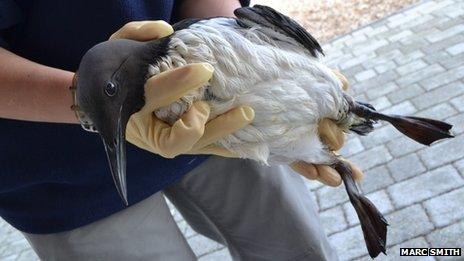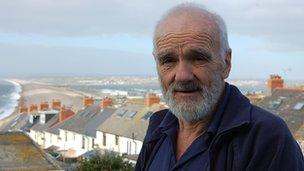Chesil Cove seabird rescuer talks of 'distress'
- Published

Mostly guillemots have been found but also some auks and razorbills
A nature enthusiast has spoken of his "distress" at discovering the first of hundreds of seabirds to wash up on the south coast covered in a mineral oil substance.
Gary Hockett, 64, from Underhill on Portland found the first six birds at Chesil Cove in Dorset on Wednesday morning.
"They were still alive, yet so still and lifeless because they must have been so exhausted," he said.
His find prompted the RSPCA rescue and retrieval of live and dead birds which have been found mainly in Dorset, but also at other sites between Cornwall and West Sussex.
"We found about 30 that first day along the Chesil coastline," Mr Hockett added.

Gary Hockett moved to Portland from London two years ago because of his love of the Jurassic Coast
"Their webbed feet were stuck together, the feathers on their undersides were congealed and had bits of plastic, pebbles and other debris stuck to them - it was such a distressing sight."
More than 300 birds, mostly guillemots but also some razorbills and auks, are being treated at the RSPCA West Hatch centre near Taunton, Somerset.
Scientists from the Environment Agency identified the substance on Friday as a refined mineral oil, but said it was not from an animal or vegetable-based oil.
Dorset Wildlife Trust said the substance had caused burns to the the legs of affected birds and described it as "potentially harmful" to humans, although no injuries have yet been reported.
Marc Smith, Chesil Beach Centre officer for the trust, said: "A lot of the birds have frozen or starved to death, and many others have simply drowned."
The trust said the oil reduces the waterproof coating of the birds' feathers and their ability to stay warm and afloat at sea.
'Suitcase of underwear'
Mr Hockett, who regularly clears rubbish from the shale at Chesil Cove, said he "wasn't surprised" many of the birds had washed up there.
"Everything collects here from fishing line to plastic chairs and shoes - the most unusual thing I found here once was a suitcase filled with nothing but underwear," he said.
"The beach changes shape every day - things are constantly covered, uncovered and moved."
He said his first instinct when he found the birds was to remove them from the beach.
"Kestrels, buzzards and even foxes hunt for prey on this stretch of coastline and I didn't want them picking up and eating contaminated birds," Mr Hockett added.
Mr Smith said the oil could "potentially affect the food chain and therefore have a knock-on effect on other wildlife".
Marine conservation officer for the trust, Emma Rance, added: "It's a massive concern at a time when the marine environment is already incredibly vulnerable.
"It won't just affect birds but it is potentially harmful to fish, whales, dolphins and many other species."
Jack Dunne, from Fortuneswell, regularly walks his dog, Flo, at Chesil Cove.
The 24-year-old said although he had not seen any birds washed up on the shore he had heard many local residents talking about their discovery on the island.
"It's really sad, especially because of the fact they were so helpless," he said.
"It's a well used beach and very popular with swimmers in the summer - had this happened in May or June time they may have been discouraged from going in the water."
Mr Hockett agreed: "It would definitely have deterred the tourists in the summer."
Councillor Ian Bruce, head of tourism and culture at Weymouth and Portland Borough Council, said: "Everybody will be upset about the pollution of our seas but I am very pleased to report there has been no sign of pollution on our beaches, and I am confident this will in no way affect our tourism industry."
He added the council would do "all it can" to assist the RSPCA.
- Published5 February 2013
- Published4 February 2013
- Published3 February 2013
- Published2 February 2013
- Published1 February 2013
- Published31 January 2013
- Published31 January 2013
- Published19 July 2011